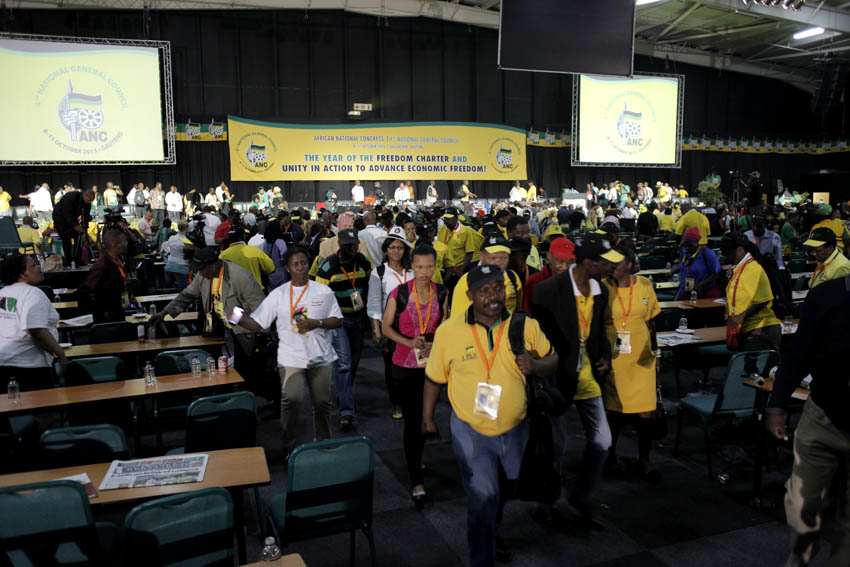Jacob Zuma closing off the ANC NGC on Sunday.
ANC president Jacob Zuma urged party delegates and leaders to work towards restoring voters’ faith in the party by cleaning the governing party’s image. Zuma said this in his closing address to the ANC’s national general council (NGC) in Midrand on Sunday.
- For more of the M&G’s coverage of the ANC’s national general council, click HERE.
For three days at the ANC’s mid-term conference, corruption that taints the party’s image as well as factionalism in the governing party dominated discussions by more than 3 000 delegates.
At the end of the gathering it was agreed that the party’s image needs to be protected by cracking down on corrupt elements within the party’s ranks. Zuma announced that the party will initiate a process that will see lifestyle audits being conducted on all government employees. With seven months to go before the local government elections, the ANC will need to work against time to reclaim credibility lost because of allegations of corruption and factional politics, which has already cost the party some of the 1.2-million members it had attracted by its centenary celebrations in 2012.
Addressing delegates at the end of the NGC on Sunday, Zuma presented the ANC’s plan to curb corruption both within the party and the government it leads. The ANC’s integrity commission was given more teeth to deal with ANC members and leaders whose conduct bring the organisation into disrepute. Instead of simply making a recommendation that requires approval by the national executive committee, the commission will now have the powers to make a final decision on cases brought against it. “The NGC has agreed that the integrity commission should be fully supported and resourced so that it can promote ethical behaviour within the ANC,” Zuma said.
The Mail & Guardian, however, learned from sources who were delegates to the NGC that an agreement to increase the integrity commission’s powers was not easily reached because of different opinions. The sources claimed there were those who argued that the integrity commission was not a constitutional body of the ANC and could be used to purge opposing factions.
Those who argued against the commission’s increased powers – who sources claimed were mostly aligned to a group of three premiers known as the Premier League – also argued that this resolution would undermine the Constitution of the country, which maintains that an accused person remains innocent until proven guilty.
In his organisational report, ANC secretary general Gwede Mantashe said the ANC could no longer use the technical argument of saying people should retain their innocence until proven guilty while the party’s name is suffering. ANC Free State chairperson Ace Magashule, appeared to disagree with Mantashe, telling the SABC on Saturday that Mantashe’s organisational report was a one-man report. M&G sources claimed that during commission discussions Magashule was the first to raise concerns about increased powers for the integrity commission and was supported by his North West counterpart Supra Mahumapelo. The ANC Youth League is said to have backed the two provincial chairpersons’ argument, with league president Collen Maine apparently arguing in favour of people remaining innocent until proven guilty, saying South Africa is a constitutional democracy.
Their argument was, however, defeated, raising questions about the influence the Premier League is perceived to have. In a build-up to the NGC, the Premier League was believed to enjoy adequate influence to convince delegates at the NGC to follow their lead.
Gauteng premier David Makhura is said to have opposed their argument saying the integrity commission has worked well in Gauteng. The M&G could not independently verify the claims with Magashule, Mahumapelo and Makhura or get their comments.
ANC head of the communications sub-committee Jackson Mthembu said the danger with the notion of regarding the accused as innocent until proven guilty, was that it tainted the ANC’s image. “Why have the integrity committee if we are going to wait? In Mangaung we said comrades should be brave enough to step aside when they were facing allegations of corruption. This never worked. That is why we are saying the integrity committee must take decisions,” he said.
Mthembu said referring to the organisational report as a one-man document was an attempt to tarnish Mantashe’s name as the report was discussed in both the NEC and the national working committee meetings. “These are some of the tendencies we have to deal with. It will take a bold leadership to deal with these issues. You can’t say the report discussed in the NEC was a one man report,” he said.

ANC delegates leaving the NGC on Sunday.
The ANC established the integrity commission in 2013 to protect the image of the party that is negatively affected by allegations of corruption. This commission is made up of ANC veterans and struggle stalwarts who do not harbour ambitions of holding office.
Zuma said strengthening the integrity commission is part of an effort to root out corruption and factionalism in the party. “However. the NGC has also cautioned that the integrity commission should not be abused for factional purposes or as an instrument to fight certain individuals within the movement,” he said.
The NGC stressed the need to fight factionalism in the organisation. ANC head of policy Jeff Radebe said those found guilty of promoting factionalism and the politics of slates would be disciplined.
“To confront the practice of factionalism in leadership elections, we agreed that the formalisation of lobby groups and the promotion of slates should be disciplinary offences,” he said.
Meanwhile, Zuma said the ANC wants proper vetting processes of all employees as well as those appointed in state entities as another way of fighting corruption. The ANC wants a single vetting agency for the state to vet all strategically placed civil servants including those appointed in state-owned enterprises, said Zuma.